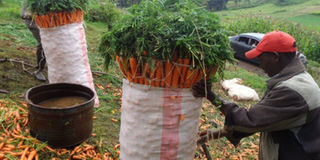ABCs of carrot cultivation

Farmers prepare to transport carrots to the mrket after harvesting. Courtesy photo
Carrots are emerging as a crop of choice among many smallholder farmers due to their affordable management schedules, quick maturity and high returns with a kilogramme retailing for as much as Shs10,000.
Requirements
The crop grows well in cool to warm climate although it is recommended that they are grown in temperatures ranging from 15 to 20 degrees and very high temperatures result in pale carrots with shorter roots and poor flavour.
In order to get the best quality, a farmer is advised to plant them in deep, well drained, well prepared loamy soils that allow the roots to penetrate and swell.
Soils with a PH of 6.5-7.5 are suitable for their growth and one should note that it is a very sensitive crop to acidic soils. If the PH is lower than 5.5 it is advisable to apply moderate amounts of rock phosphate fertilisers to reduce acidity.
Seedbed
Carrots are planted directly into seedbeds and the right spacing must be applied in order. Too much closeness causes overcrowding ultimately leading to poor yields. Per hectare, use about six to seven kilogrammes of carrot seeds.
Soils, weeding
The soils must be well prepared and the seeds inserted at about one centimetre deep in the soil and a spacing of about 20 to 30 centimetre apart.
“Weeding is advised to commence two weeks after planting the crop and this is the same period where a farmer is advised to thin the crops in order to provide enough space to grow well,” says Paul Wafula an agronomist and farmer in Busia District.
The second weeding is advised after about five weeks of planting although it may be initiated earlier depending on the emergence of weeds.
The crop do not need much space and, therefore, ideal for intercropping with a number of crops such as lettuce, tomatoes, capsicums and leek, among others.
Intercropping
The best ideal intercropping symbiotic model is planting them together with lettuce.
“When they are intercropped, carrots can drive away worms from lettuce while they help repel flies from the carrots. They need frequent rains and in case the rains are unreliable, constant irrigation is recommended with the rate of irrigation depending on the type of soil in question,” Wafula adds.
Due to their poor water retention capacity, sandy soils require more water than loamy soil.
The crop is susceptible to pests like aphids, root-knot, nematodes, cutworms, African army worm among others. They are also affected by fungal diseases like powdery mildew, leaf blight among others. In order to avert the pests and diseases, rotational farming is advised although if they are infested by the pests and diseases spraying is recommended. In addition, farmers are advised to observe hygiene while planting, use resistant hybrid seeds and ensure carrot seeds are certified disease-free.
Maturity
The maturity period for carrots ranges between three and four months after planting depending on the variety in question.
It is advisable to begin harvesting when the roots are soft and juicy and if a farmer takes long to harvest, the resultant crops are of less quality because they crack.
The crop is pulled from the soil manually with the hand or using a spade. Trim the tops completely to avoid storage rots and mature carrots that are pests and disease free can be stored for 100-150 days when the leaves are completely removed. They are stored at cool temperatures of 1-4 degrees centigrade.
“I normally have three seasons, between December to March, April to July and August to November.” Harvesting begins when the roots are big, soft and juicy.
Late harvesting may result in poor quality produce as the carrots may crack, Wafula says. After harvesting the seven tonnes of the produce, he feeds the green fibrous part and produce considered rejects to his three Friesian cows.
Powdery mildew, black root rot and bacteria wilt are some of the diseases that affect carrots.
“The first two can be treated by curative fungicides,” says Andrew Monje, an agronomist.
Nutrients
Carrots are excellent sources of vitamin A, C, calcium and iron. They are also a rich source of beta carotene, a powerful antioxidant that helps maintain a healthy skin and good eyesight. Carrots also help in killing harmful germs in the mouth, thus preventing tooth decay.
Carrots can be consumed in various ways that include steaming, eat raw, cooking or making carrot juice.




